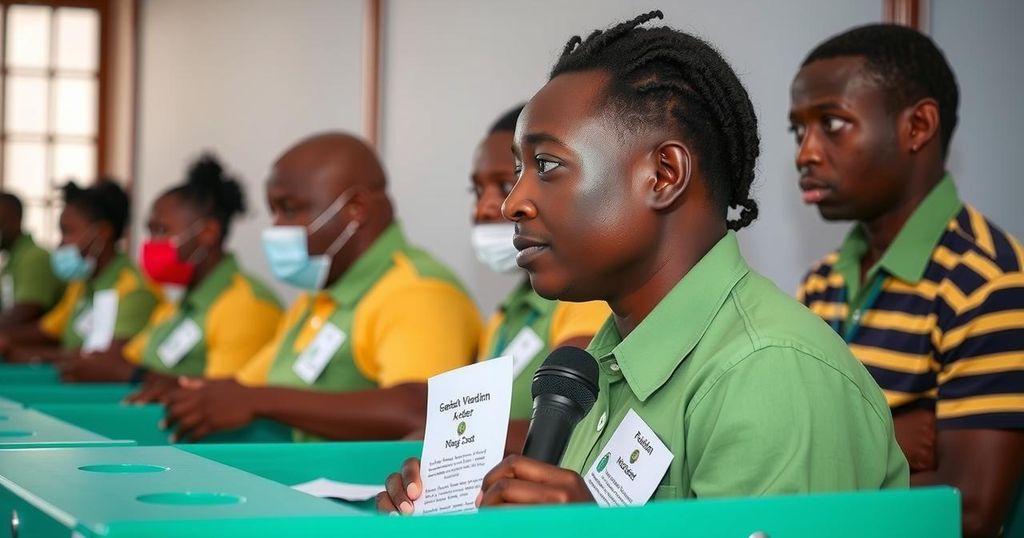Gabonese Referendum Reveals Strong Support for New Constitution

Gabon’s military rulers announced that their new constitution was largely approved in a recent referendum, with provisional results indicating 91.8 percent support. The constitution limits presidential terms to two seven-year periods and establishes criteria that disqualify certain former leaders. With a 53.54 percent voter turnout, the referendum is viewed as a historic step, though criticisms have emerged regarding its authenticity and implications for future governance.
The provisional results announced by Gabon’s military rulers indicate that their proposed new constitution has achieved overwhelming approval in a recent referendum. The vote, in which approximately 860,000 registered voters participated, revealed that a significant 91.8 percent endorsed the new constitutional framework, as stated by the Committee for the Transition and Restoration of Institutions. The new constitution outlines a presidential structure limiting terms to a maximum of two seven-year periods while eliminating the role of a prime minister and prohibiting dynastic succession.
During the referendum campaign, governmental authorities actively encouraged voter participation through various media platforms, urging citizens to exercise their civic duty by casting votes—green signifying approval and red indicating opposition. Though voter turnout was reported at 53.54 percent, lower than the 71 percent earlier reported by public broadcaster Gabon TV, the process proceeded without major disturbances across the 2,835 polling stations nationwide.
The newly proposed constitution mandates that presidential candidates must be exclusively Gabonese, requiring at least one Gabon-born parent and a Gabonese spouse. This regulation effectively disqualifies former president Ali Bongo Ondimba and his offspring. Transitioning president Brice Oligui Nguema characterized the referendum as a historic advancement for the nation and confidently remarked about the transparent voting process, as he exercised his franchise in Libreville.
Although Nguema has expressed intentions to return power to civilian governance within two years, he is also positioning himself for a presidential bid in August 2025. Public sentiment during the referendum campaign has been notably shaped by pro-junta propaganda, leading to questions about the authenticity of the referendum versus serving as a mere electoral campaign.
Concerns have emerged from critics who argue that the new constitution seems tailored to perpetuate authoritarianism. Legal expert Marlene Fabienne Essola Efountame stated, “We are creating a dictator who designs the constitution for himself.” With the backdrop of a potentially changeable political landscape—after the lengthy rule of Bongo and the subsequent coup—the outcomes of this referendum may significantly influence Gabon’s governance trajectory moving forward.
Despite the recent political upheaval, a significant proportion of the population remains hopeful. An Afrobarometer survey revealed that nearly 87 percent of respondents believe the country is heading in the right direction, although challenges such as high unemployment and poor infrastructure continue to remain pressing concerns. As Gabon approaches this pivotal moment in its history, the final results of the referendum will be scrutinized by both national observers and democracy advocates.
Gabon has experienced significant political turmoil following a military coup that ousted long-time president Ali Bongo Ondimba, who had been in power for over 14 years. The new military leadership has proposed a constitution aimed at restructuring the political framework of the nation, including limitations on presidential terms and eligibility criteria that exclude former leaders and their families. The recent referendum represents a crucial step for the junta and the nation as it seeks to establish a new governance structure amidst public scrutiny and concerns about the legitimacy of the political process.
The overwhelming approval of Gabon’s new constitution, as reported by provisional results, marks a significant shift in the political landscape of the country. With a strong public endorsement against the backdrop of a turbulent political history, this referendum may potentially reshape Gabon’s governance moving forward. However, the legitimacy of the process has been questioned by opponents, highlighting the delicate balance between military authority and civilian governance that remains to be navigated in the coming years.
Original Source: www.tiogapublishing.com







